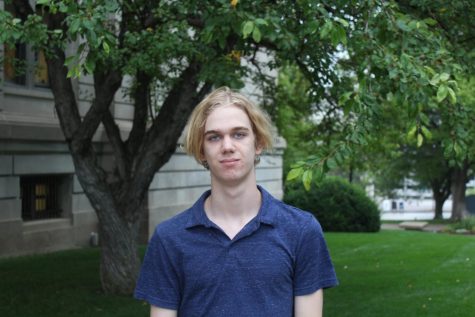Menten awarded honorary degree from Grinell
May 16, 2018
English and Theory of Knowledge teacher Tracey Menten has been awarded an honorary Doctorate of Humane Letters from Grinnell College. The degree is awarded to one teacher each year from across the country based on the nominations of current Grinnell students. Menten was nominated by former students James Dumont, a 2014 Central graduate who is graduating from Grinnell this year, and Emma Kalkowski-Farrand, who graduated from Central in 2015.
“I had two students nominate me,” Menten said. “They usually only get one nomination letter, but for whatever reason Emma decided to write a letter as well.”
The degree, for Menten, is meaningful because it is indicative of the positive impact she had on her students’ lives, something that teachers too rarely get to see after their students graduate.
“The fact that someone who’s graduating from college thought enough of me to even think to nominate me was pretty cool,” Menten said.
The degree comes after nine years of teaching at Central, and around nineteen after she began teaching in Arizona at 28 years old. She had always wanted to be a teacher, but had at first been intimidated by the idea of standing up in front of a classroom.
“The only two places in life that I’ve ever felt completely myself and safe are the library and school,” Menten said. “So it was either be a librarian, or be a teacher.”
The more she taught, the more Menten improved as a teacher — and the more she became aware of flaws in the education system.
“Public education in the United States is fundamentally flawed in a lot of ways because we teach that what’s important is the end result, whatever that is, your diploma, your degree,” Menten said, “and we’ve lost this love of what’s important—the means.”
In her classes, she teaches the way she thinks school ought to be taught, asking questions, and teaching the process of learning more than the content. To her, it is more important for her students to graduate with the ability to develop and defend their positions than it is for them to memorize facts.
“We’re in a place where critical thinking is not valued in the way that I think it should be, so that’s why I think it’s important to teach people, one at a time, why thinking is important, not what to think, but how to think,” Menten said.
Ultimately, Menten teaches because the world is better served by people who have the ability to think critically and engage in respectful, productive discussion.
“I do think you change the world one person at a time,” Menten said. “I think you model what you’d like to see, in terms of people, in the world, and I think that’s what teaching is.”














